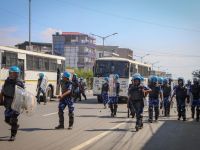Ever since the Taliban takeover of Afghanistan last August, millions of the Hazara minority have been in fear of the new rulers of the country, whose first round of governance in the late 1990s did not treat the racial group well.
While the Hazara's persecution in Afghanistan dates back to the late 19th century, when Emir Abdur Rahman Khan's regime killed and displaced thousands of them between 1880–1901, the group who is known for Mongolian facial features and practicing Shia Islam, has been living through difficult conditions under the many different political eras in Afghan history.
Strongmen with close ties to local #Taliban officials have forced hundreds of Hazara families to leave thier villages, lands&homes in Daikundi, EtilaatRoz and 8am Newspapers report. Talibs have ordered the villagers not to even take thier own agriculture products when they leave.
— Sharif Hassan (@MSharif1990) September 26, 2021
There is an ongoing ethnic cleansing in #Daikundi. The Taliban have asked about 800 #Hazara families to leave their homes and land, otherwise they will face military action. Photo via Radio Nasim.#StopHazaraGenocide pic.twitter.com/zJXDfw02xT
— Bamiyan | بامیان (@BamiyanLove) September 23, 2021
For weeks now, local reports have warned of what has been described as a "new genocide" against the Hazara people, especially after hundreds of families in the Daykundi province have been ordered to evacuate their homes "over the legality of land."
Forced migration of #Hazara locals of Gizab in #Daikundi continues. 1000s of low-income families were forced by the Taliban to leave what the group calls disputed lands. People were allowed to take only clothes and day-to-day necessities, but not harvests. Video by locals. pic.twitter.com/jzoHA1NKSI
— Mahdi Akhlaqi (@MahdiAkhlaqi1) September 26, 2021
On social media, local reporters and individuals have been posting photos and videos showing Hazara families being displaced from their homes in Daykundi, trying to find refuge in new homes across the country.
Meanwhile, some users warned that "continuous injustices against the Hazara people might trigger fighters to mobilize militarily" and prompt a violent conflict.
Other online commentators also questioned the silence of the international community especially after several countries have expressed their willingness to "recognize and work with the Taliban" in the coming weeks, calling on them to seize the opportunity and demand fair treatment of the Hazara people under the Taliban.
These #Hazara villagers say they have received letters from Taliban to leave the village within 3 days. They say they have documents from King Zahir Shah’s era proving their ownership of the lands but Taliban don’t give heed to their pleas. #Afghanisran pic.twitter.com/mLolLeNjEr
— Saleem Javed (@mSaleemJaved) September 26, 2021
#Resistance2 is spreading across #Afghanistan. These #Hazara fighters have taken up arms to join the #resistance in Daikundi after 100s of families were forced by the #Taliban to leave their homes and fertile lands, which was subsequently redistributed to the #Talibans. pic.twitter.com/6mYDZo8gQP
— Afghan Resistance (@AfghanResistnce) September 24, 2021








